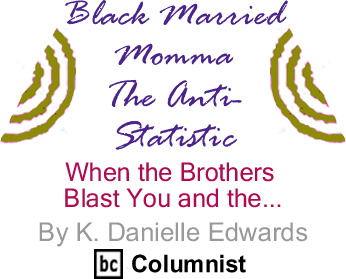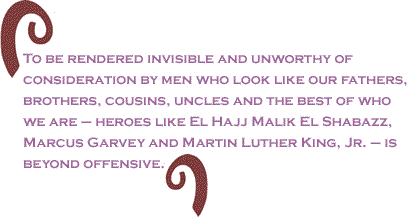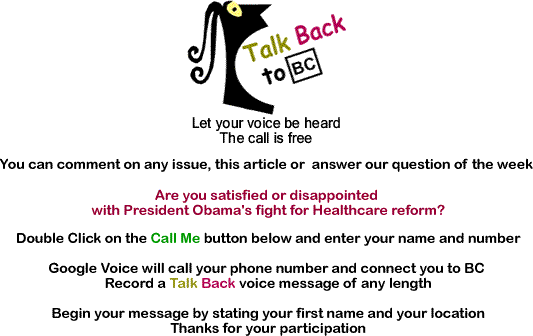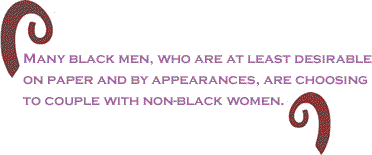
|
||||||||||||||||||||||

|
|
 |
|
| As
much as I am proud and thankful to be married to a beautiful black
man, I cannot help but look at many of today’s headlines on the
state of black marriage and relationships with a bit of déjà vu.
As a solution, couples counselor Audrey Chapman posited that black
women need to deprogram themselves from an ideal and image that
many of us have downloaded and reinvented since we first became
interested in boys – that whatever preferred characteristics we
want him to possess (money, education, interests, etc.), he must
be black at all costs.
A woman who resembles the daughter he is apt to have, no matter
the race of the mother. A woman who looks like his sisters, cousins
and aunts.
Even
if sisters are overcoming many of the issues that prevent them from
dating white men – such as a sense of racial loyalty and pride,
feeling that they are not attracted to European features, and the
seldom discussed history of sexual assault by white men against
black women – some of this openness or openness to become more open
rubs me the wrong way. Why? Because it’s reactionary, circumstantial
and, as a result, insincere in many cases.
This experience was followed with a succession of approaches and
exposures that collectively made me feel as if any suitor I made
it solid with would be white. As attractive as I once found certain
white men of the “dark,” swarthy variety, I still felt deeply, palpably,
that I would feel most comfortable, at peace among and at home with
a black man who would understand why I sometimes wrap my hair in
a silk scarf at night, what shea butter is and why I use it, and
why I occasionally drop my “-ings” when I’m yapping at home and
off the clock. This man would need no context or back story about
why certain occurrences made me mad, why a particular look was held
a little too long or too suspiciously, or even why a discussion
of the “what ifs” just isn’t worth entertaining some time.
Now, this is not to say that black women shouldn’t date white men.
Many people deserve to find happiness, love and reciprocity. People
want to feel appreciated and feel needed. Our biological clocks
only tick for so long. Statistics prove that some American sisters
will be left out to dry if they await their own vision of their
African-American prince. BLACK
MARRIED MOMMA are musings from BlackCommentator.com
Columnist K. Danielle Edwards - a Black full-time
working mother and wife, with a penchant for prose, a heart for
poetry, a love of books and culture, a liking of fashion and style,
a knack for news and an obsession with facts - beating the odds,
defying the statistics. Sister
Edwards is a Nashville-based writer, poet and communications professional,
seeking to make the world a better place, one decision and one action
at a time. To her, parenting is a protest against the odds, and
marriage is a living mantra for forward movement. Her work has appeared
in MotherVerse Literary Journal, ParentingExpress, Mamazine, The Black World Today, Africana.com, The Tennessean
and other publications. She is the author of Stacey Jones: Memoirs of Girl & Woman, Body & Spirit,
Life & Death |
|
|
|
 |
|
Any BlackCommentator.com article may be re-printed so long as it is re-printed in its entirety and full credit given to the author and www.BlackCommentator.com. If the re-print is on the Internet we additionally request a link back to the original piece on our Website. Your comments are always welcome. eMail re-print notice
If you send us an eMail message we may publish all or part of it, unless you tell us it is not for publication. You may also request that we withhold your name. Thank you very much for your readership. |
|
| |
|
| October
22 , 2009 Issue 347 |
|
| Executive Editor: Bill Fletcher, Jr. |
| Managing Editor: Nancy Littlefield |
| Publisher: Peter Gamble |
| Est. April 5, 2002 |
Printer Friendly Version
in resizeable plain
text format or pdf
format. |
 |

|
| |
| |











































